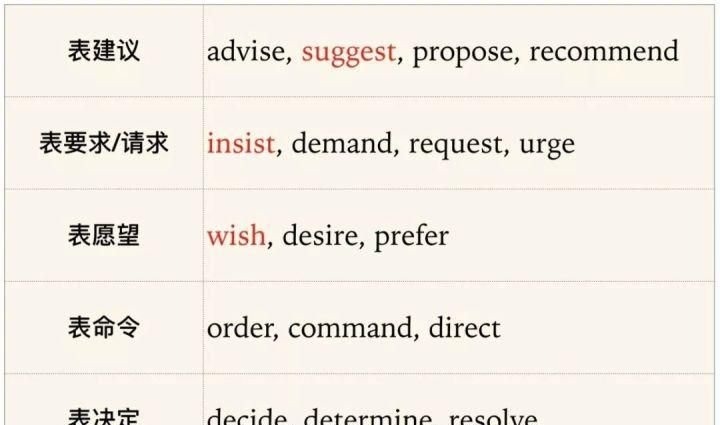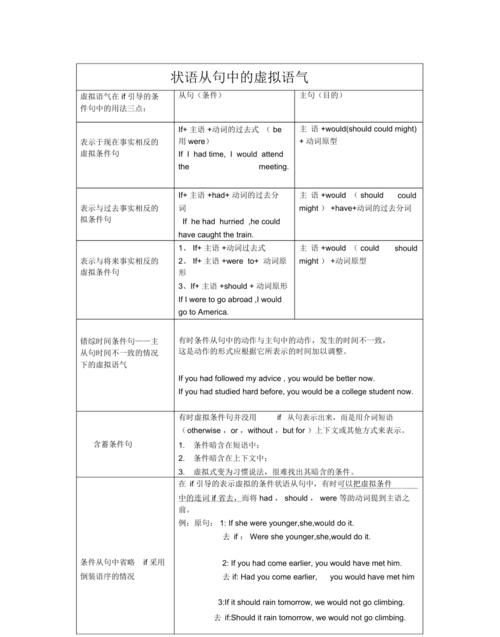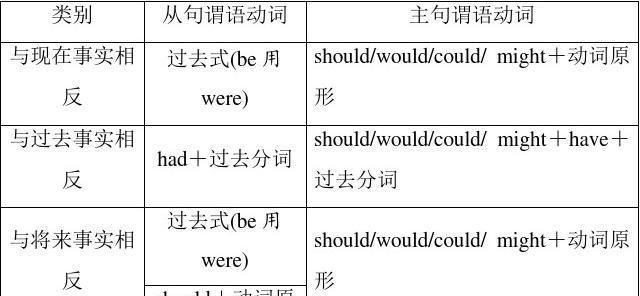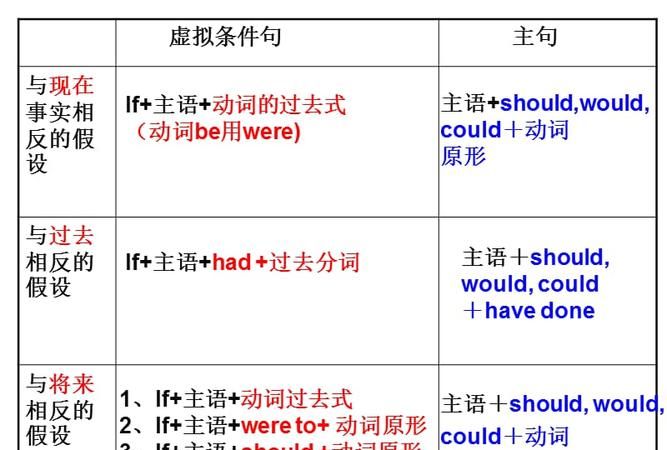本文目录
虚拟语气的定义是啥?
定义:以if为开头的条件从句且与内容事实相反或发生的可能性极小的事件
典型虚拟语气词:
If,
Without\But
for,
Overwise,半倒装(将if省略后,把were,had,should提到句首)

虚拟语气例句大全
虚拟语气是一种动词形式,表示说话人的一种愿望,假设,怀疑,猜测, 建议等含义,虚拟语气所表示的含义不是客观存在的事实。在条件句中的应用,条件句可分为两类,一类为真实条件句,一类为非真实条件句。非真实条件句表示的是假设的或实际可能性不大的情况,故采用虚拟语气。
一、虚拟语气在从句中的使用
虚拟语气即表达不可能发生或与预期相反的情况。首先我们应熟悉它在三种时态里的使用情况,这是正确使用虚拟语气的基础。这三种时态是:现在;过去;将来。
1、表示现在的虚拟式
时 态从 句 动 词主 句 动 词
现 在 did would + do
If I were a bird, I would fly to you. 如果我是只鸟,我就会飞到你身边去。
If it were not for their help, we should be in a very difficult position.
如果不是他们的帮忙,我们就会处于一个非常困难的境地。
2、表示过去的虚拟式
时 态从 句 动 词主 句 动 词
过 去had + donewould + have + done
If we had started earlier, we should not have missed the train.
如果我们早一点动身的话,就不会误车了。
If she hadn’t been ill, she might have come.如果她不是病了,可能会来的
3、表示将来的虚拟式
时 态从 句 动 词主 句 动 词
将 来should + do
were to + dowould + do
If Professor Li should have time tomorrow, we could ask him some questions.
如果李教授明天有空的话,我们可以问他点问题。
If there should be no air, there would be no living things.
如果没有空气,就不会有生物。
二、错综时间的虚拟句
通常情况下,在非真实条件句中主句和从句的谓语动词所指时间是一致的, 但有时也可能指不同的时间,这时要根据上下文的意思采用不同的谓语动词形式.
If I were you, I would have taken his advice. (从句指现在, 主句指过去)。
换成我是你,我就会听从他的建议。
If I had taken my raincoat with me this morning, I would not be wet now. (从句指过去,主句指现在)。如果我今天早上带了雨衣,现在就不会被淋湿了。
If we hadn’t been working hard in the past few years, things wouldn’t be going so smoothly.
(从句指过去,主句指现在)。如果过去几年里不努力工作,现在的情况就不会如此顺利了。
If the weather had been more favorable, the crops would be growing still better.(从句指过去,主句指现在)。如果当时的天气更好点,现在的庄稼就会长得更好。
If we had not got everything ready by now, we should be having a more terrible time tomorrow. (从句指现在,主句指将来)
如果现在一切还没准备好,明天情况就更糟了。
三、含蓄条件句
有时假设的情况并不以条件从句表示出来,二是暗含在上下文中,比如通过介词短语来表示。这些介词常是:but for, without, otherwis等。如:
But for your advice, I could not have done it so successfully.
如果不是听了你的建议,我就不会做的如此成功。
The change could not have taken place without the open-door policy.
没有开放的政策,就不会有如此大的变化。
I was so busy then, Otherwise, I would have told him the answer.
我当时很忙,否则,我就会把答案告诉他的。
四、虚拟语气在某些从句中的应用
1、wish后的宾语从句(would rather (sooner) 后也是如此)
I would rather they came tomorrow. 我宁愿他们明天来。
How I wish it wasn’t raining now. 如果现在不下雨该多好呀!
I wish I had not been to yesterday’s party. 我要不去参加昨天的宴会就好了!
但would rather 后没有主语则应使用零不定式.
2、suggest, order, demand, propose, command, request, desire, insist 等动词后的宾语从句
They demanded that the aggressor troops (should) be withdrawn immediately.
他们要求侵略者立刻撤退。
I propose that we (should) set a deadline for handing in the plan.
我提议应该制定一个交计划的最后期限。
3、it is desired, it’s suggested, it’s requested, it was ordered that, it was proposed that, it is necessary that, it is important that, it has been decided that 等之后的主语从句:
It is necessary that he (should) be sent there at once. 有必要立刻派他前往。
It’s required that Mr. Lee (should) give a performance at the party.
要求李先生在晚会上出个节目。
It’s desired that we (should) get everything ready by tonight.
要求我们在今晚前把一切准备好。
4、在suggestion, motion, proposal, order, recommendations, plan, idea 等后面引出的表语从句和同位语从句中:
The order came that all villagers evacuate from the village.
要求所有村民撤退的命令下达了。
I second Xiao Li’s motion that we set up a special board to tackle the problem.
小李提议成立一个特别委员会处理此问题,我附议。
5、在下列句型中要用 should +动词原形。如:it is a pity, it is a shame, it is incredible, it is strange, it is no wonder
It is a great pity that he should be so conceited.
很可惜,他这个人竟然这么自大。
It’s strange that she should have failed to see her own shortcomings.
奇怪的是他竟看不到自己的缺点。
6、as if, as though 引起的从句,其用法同 wish 构成的宾语从句一样
I remember the whole thing as if it happened yesterday.
我清楚地记得这件事就象昨天刚刚发生的。
It seems as if it were spring already 似乎现在已经是春天的样子了。
7、以 lest, for fear that, in case 引出的从句,动词多用 should + 动词原形,表示 “惟恐”的意思。
He took an umbrella with him lest it should rain. 他带上雨伞以免下雨。
He burned all the important documents for fear that they should fall into the enemy's hands.
他把所有的重要文件全部烧毁以免落入敌人的手中。
Here’s some money in case you should need it. 这是点钱以免你用地着。
8、在 if only 引出的感叹句中
If only I hadn’t lost it! 如果我要不丢该多好!
If only I could see him once! 再能看到他一次该有多好!
Oh, if he only knew how we miss him! 噢,希望他能知道我是多么思念他!
9、在 it is high time that 之后的定语从句中,谓语动词常用过去式表表示虚拟语气。
It is time that we went (should go) to bed. 现在该上床了。
It’s high time that we (should) put an end to this controversy.
现在该是结束这场争辩的时候了。
10、用于expect, believe, think, suspect 等动词的否定或疑问形式后的宾语从句中。
I never expected that the new apartment should be so small. 没料到这桩新公寓竟这么小。 虚拟语气是一种动词形式,表示说话人的一种愿望,假设,怀疑,猜测, 建议等含义,虚拟语气所表示的含义不是客观存在的事实。在条件句中的应用,条件句可分为两类,一类为真实条件句,一类为非真实条件句。非真实条件句表示的是假设的或实际可能性不大的情况,故采用虚拟语气。
一、虚拟语气在从句中的使用
虚拟语气即表达不可能发生或与预期相反的情况。首先我们应熟悉它在三种时态里的使用情况,这是正确使用虚拟语气的基础。这三种时态是:现在;过去;将来。
1、表示现在的虚拟式
时 态从 句 动 词主 句 动 词
现 在 did would + do
If I were a bird, I would fly to you. 如果我是只鸟,我就会飞到你身边去。
If it were not for their help, we should be in a very difficult position.
如果不是他们的帮忙,我们就会处于一个非常困难的境地。
2、表示过去的虚拟式
时 态从 句 动 词主 句 动 词
过 去had + donewould + have + done
If we had started earlier, we should not have missed the train.
如果我们早一点动身的话,就不会误车了。
If she hadn’t been ill, she might have come.如果她不是病了,可能会来的
3、表示将来的虚拟式
时 态从 句 动 词主 句 动 词
将 来should + do
were to + dowould + do
If Professor Li should have time tomorrow, we could ask him some questions.
如果李教授明天有空的话,我们可以问他点问题。
If there should be no air, there would be no living things.
如果没有空气,就不会有生物。
二、错综时间的虚拟句
通常情况下,在非真实条件句中主句和从句的谓语动词所指时间是一致的, 但有时也可能指不同的时间,这时要根据上下文的意思采用不同的谓语动词形式.
If I were you, I would have taken his advice. (从句指现在, 主句指过去)。
换成我是你,我就会听从他的建议。
If I had taken my raincoat with me this morning, I would not be wet now. (从句指过去,主句指现在)。如果我今天早上带了雨衣,现在就不会被淋湿了。
If we hadn’t been working hard in the past few years, things wouldn’t be going so smoothly.
(从句指过去,主句指现在)。如果过去几年里不努力工作,现在的情况就不会如此顺利了。
If the weather had been more favorable, the crops would be growing still better.(从句指过去,主句指现在)。如果当时的天气更好点,现在的庄稼就会长得更好。
If we had not got everything ready by now, we should be having a more terrible time tomorrow. (从句指现在,主句指将来)
如果现在一切还没准备好,明天情况就更糟了。
三、含蓄条件句
有时假设的情况并不以条件从句表示出来,二是暗含在上下文中,比如通过介词短语来表示。这些介词常是:but for, without, otherwis等。如:
But for your advice, I could not have done it so successfully.
如果不是听了你的建议,我就不会做的如此成功。
The change could not have taken place without the open-door policy.
没有开放的政策,就不会有如此大的变化。
I was so busy then, Otherwise, I would have told him the answer.
我当时很忙,否则,我就会把答案告诉他的。
四、虚拟语气在某些从句中的应用
1、wish后的宾语从句(would rather (sooner) 后也是如此)
I would rather they came tomorrow. 我宁愿他们明天来。
How I wish it wasn’t raining now. 如果现在不下雨该多好呀!
I wish I had not been to yesterday’s party. 我要不去参加昨天的宴会就好了!
但would rather 后没有主语则应使用零不定式.
2、suggest, order, demand, propose, command, request, desire, insist 等动词后的宾语从句
They demanded that the aggressor troops (should) be withdrawn immediately.
他们要求侵略者立刻撤退。
I propose that we (should) set a deadline for handing in the plan.
我提议应该制定一个交计划的最后期限。
3、it is desired, it’s suggested, it’s requested, it was ordered that, it was proposed that, it is necessary that, it is important that, it has been decided that 等之后的主语从句:
It is necessary that he (should) be sent there at once. 有必要立刻派他前往。
It’s required that Mr. Lee (should) give a performance at the party.
要求李先生在晚会上出个节目。
It’s desired that we (should) get everything ready by tonight.
要求我们在今晚前把一切准备好。
4、在suggestion, motion, proposal, order, recommendations, plan, idea 等后面引出的表语从句和同位语从句中:
The order came that all villagers evacuate from the village.
要求所有村民撤退的命令下达了。
I second Xiao Li’s motion that we set up a special board to tackle the problem.
小李提议成立一个特别委员会处理此问题,我附议。
5、在下列句型中要用 should +动词原形。如:it is a pity, it is a shame, it is incredible, it is strange, it is no wonder
It is a great pity that he should be so conceited.
很可惜,他这个人竟然这么自大。
It’s strange that she should have failed to see her own shortcomings.
奇怪的是他竟看不到自己的缺点。
6、as if, as though 引起的从句,其用法同 wish 构成的宾语从句一样
I remember the whole thing as if it happened yesterday.
我清楚地记得这件事就象昨天刚刚发生的。
It seems as if it were spring already 似乎现在已经是春天的样子了。
7、以 lest, for fear that, in case 引出的从句,动词多用 should + 动词原形,表示 “惟恐”的意思。
He took an umbrella with him lest it should rain. 他带上雨伞以免下雨。
He burned all the important documents for fear that they should fall into the enemy's hands.
他把所有的重要文件全部烧毁以免落入敌人的手中。
Here’s some money in case you should need it. 这是点钱以免你用地着。
8、在 if only 引出的感叹句中
If only I hadn’t lost it! 如果我要不丢该多好!
If only I could see him once! 再能看到他一次该有多好!
Oh, if he only knew how we miss him! 噢,希望他能知道我是多么思念他!
9、在 it is high time that 之后的定语从句中,谓语动词常用过去式表表示虚拟语气。
It is time that we went (should go) to bed. 现在该上床了。
It’s high time that we (should) put an end to this controversy.
现在该是结束这场争辩的时候了。
10、用于expect, believe, think, suspect 等动词的否定或疑问形式后的宾语从句中。
I never expected that the new apartment should be so small. 没料到这桩新公寓竟这么小。

哪些词后面用虚拟语气
需要用虚拟语气的词有 动词: 一个坚持,两个命令,三个建议,四个要求。
1.insist
2. order, command
3. advise, suggest, propose
4. demand , require, request, desire
should + 动词原形,或者将should省略
记住Suggest 只有表示建议的时候才用虚拟 表示“表明”时 不用;还有就是wish 表愿望 用虚拟语气 倒退一个时态 就是一般现在时 退成 一般过去时, 一般将来 退成过去将来,现在完成 退成过去完成

哪些词后面用虚拟语气
现代英语中,通用的动词虚拟式只有两个,即be型虚拟式和were型虚拟式。所谓be型虚拟式,是指不管主语是什么人,动词一律用原形,如果动词是被动态形式,则助动词一律用be。所谓were型虚拟式,是指不管主语是什么人称,动词一律用were,动词是进行时或被动态时,助动词一律用were。
be型虚拟式
1.用于表示命令、决定。建议等词语后的that分句。例如:Mary insisted that John come. /He ordered that the books be sent at once.
2.用于if,though,whatever,lest等引导的分句中,表示推测、让步、忧虑等。例如:Though everyone desert you,I will not. /If John be found guilty,he shall have the right of appeal.
3.用于某些表示祝愿、诅咒、禁止等以及公式化的语句中。
例如:
God bless you! /Heaven forbid!
were型虚拟式
1.用于wish后的that分句中,表示与现在的事实相反的主观设想。例如:
I wish I were there.
I wish it were spring all the year round.
2.用于if,as if,as though等引导的分句和suppose或imagine等后面的分句中,表示对现在时间或将来时间的主观设想。例如:
If I were you,I should wait till next week.
He spoke to me as if I were deaf.
If it were to rain,we should get wet.
1.动词suggest,order,demand,propose,request,command,insist等后的宾语从句中,用虚拟语气(即Should+动词原形或只用动词原形)来表示愿望、建议、命令、请求等。在动词wish /would rather后的宾语从句中,用过去式表示与现在事实不符,用过去完成式表示与过去事实不符。
e.g. I suggest that we(should)set off at once.
The doctor insisted that the patient (should)be X-rayed.
I wish I were as strong as you.
I would rather that you hadn't told him.
2. 在 suggestion, proposal,idea,plan,order,advice等名词后的表语从句、同位语从句中要用虚拟语气,即should+动词原形或只用动词原形。如:
Our suggestion is that you( should)be the first to go.
My advice is that we(should)send for Doctor Li.
Do you know the order that you(should)keep watch?
3. 在It is necessary/important/strange/natural;It is requested/suggested/desired/proposed;it is a pity等结构后的主语从句中要用虚拟语气,即Should+动词原形或只用动词原形。如:
It is necessary that he(should)be sent there at once.
It is requested that Professor Li(should)give us a speech.
It is desired that we(should)get everything ready by tonight.
4. 在as if引导的状语从句中,用过去式表示与现在事实不符,用过去完成式表示与过去事实不符;They talked as if they had been friends for years.
5. 在so that,in order that引导的状语从句中,(根if状语从句中的主句形式相同)常用should/would/could/might+动词原形来表示虚拟语气。如:
She stayed at home for a few days so that she could take care of her mother.
He took a taxi to the station so that she should not miss the train.
6.在it is time后面的定语从句中常用过去式表示虚拟。
It’s time I was going.
It’s time somebody taught you to behave yourself.
7. 由wish引起的表示愿望的虚拟语气
A.用wish表示对现在的愿望时,它所引起的宾语从句中谓语动词形式为:过去式(be动词用were)。
B.用wish表示对将来的愿望时,它所引起的宾语从句中谓语动词形式为:would, could, might+ 动词原形。
C.wish用于对过去的事实表示一种不可能实现的愿望时,宾语从句中的谓语动词形式为:had+动词过去分词或could, would + have +动词过去分词。
I wish that he weren’t so lazy.
I wish I hadn't wasted so much time.
I wish she would change her mind.
8. had hoped/ planned/ thought/ wanted/ intended表示一种过去未实现的愿望或令人失望的事。
I had thought he had been dead for at least 20 years.
I had hoped that she would go to the U.S. and study there, but she said
she liked to stay in China.
9. would rather.( 与if 从句相同)
would (had) rather, would as soon, would sooner和would prefer所引起的从句中要求用过去式表示当时或将来的情况,用过去完成时表示过去的情况,表示希望或婉转的责备。例如:
I’d rather you posted the letter right away. 我倒希望你把这封信立刻寄出去。
I would prefer he didn’t stay there too long.我倒希望他不要在那儿可得太久。
I would just as soon you had returned the book yesterday.我真希望你昨天把这本书还了。
10. 虚拟语气在由某些连词,常见的这些连词和介词有:与if 从句相同
1) unless (除非),provided(倘若),supposing(假若),providing(倘若) , on condition that(如果),由这些词、词组引出的从句,动词多用过去时。
除非你命令他做,要不他是不会做的。
He wouldn't do it unless you ordered him to.
假若你有机会出国,你会去哪儿呢?
Providing(if) you had the opportunity to go abroad, where would you go?
11. for fear that(以免, 唯恐),in order that (以便),whether(不管),lest(以免),in case (假使),从句中加情态动词,有时should可省略。
他把它藏起来以免她看见。
He hid it lest she (should) see it.
我得准备点啤酒,说不定约翰会来。
I'll get some beer in case John should come.
他轻轻地进屋,以免吵醒他的同房。
He entered the room quietly in order that he should not wake his roommate.
12. if only, 与if 从句相同
如果表示对现在的愿望,句中的谓语动词常用过去式;
如果表示将来的愿望,句中的谓语动词常用would/could+动词原形;
如果表示对过去的愿望,句中的谓语动词常用had+过去分词。
if only I were you!
If only you had come yesterday!
If only Linda could go with us tomorrow!
If only I had said more about it!
还有最常见的就是if 条件句了,你应该挺清楚了吧。就不写了。

以上就是关于个虚拟语气词 ,虚拟语气的定义是啥?的全部内容,以及11个虚拟语气词 的相关内容,希望能够帮到您。
